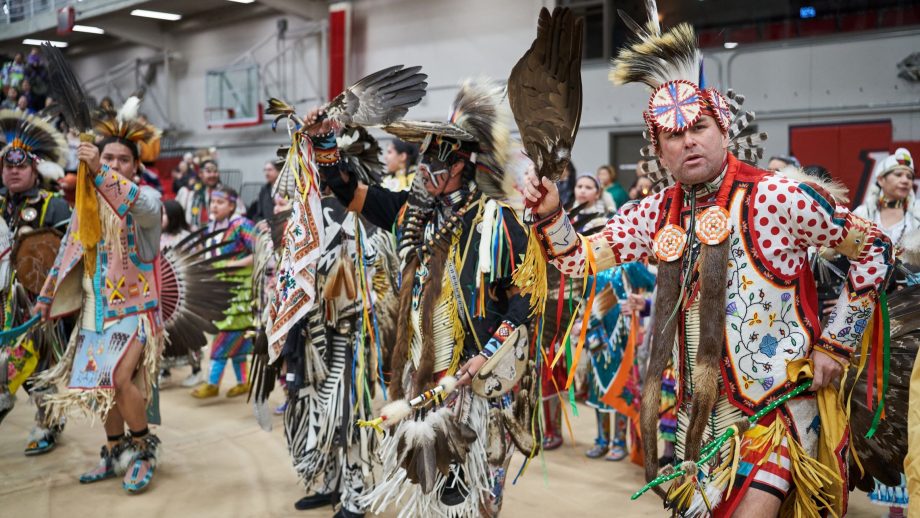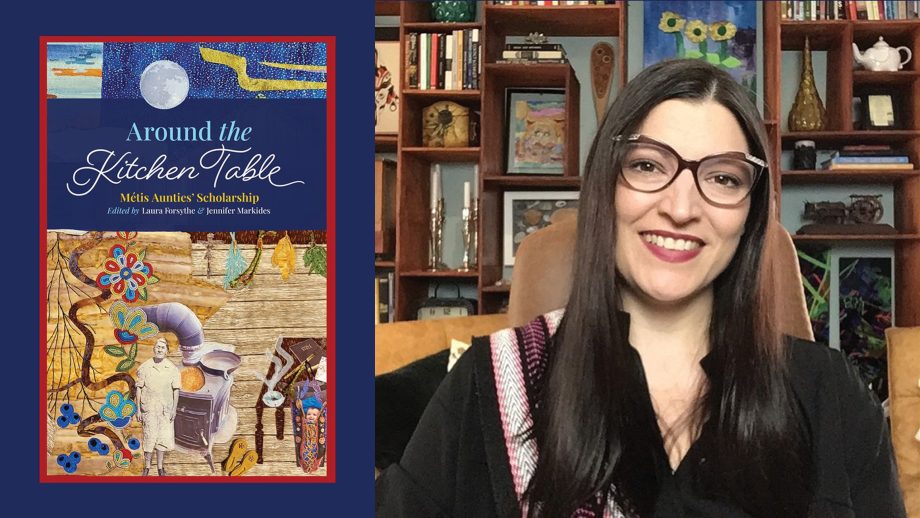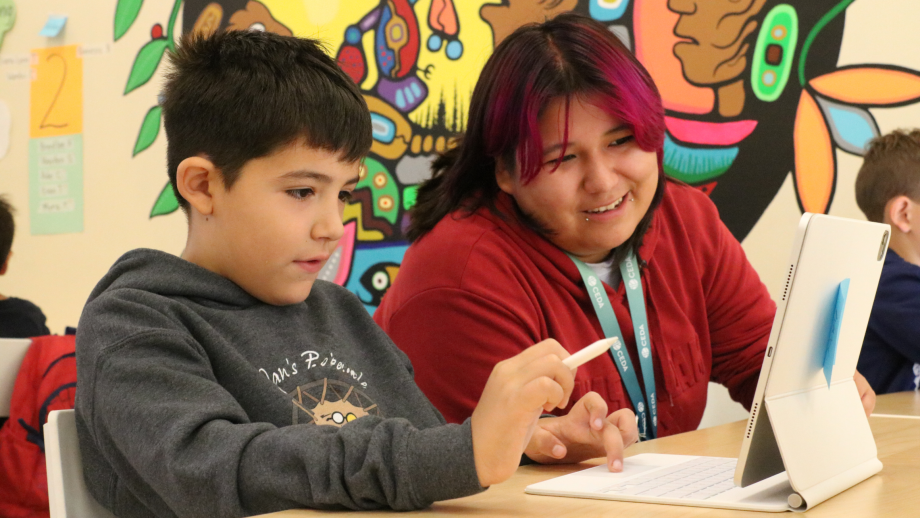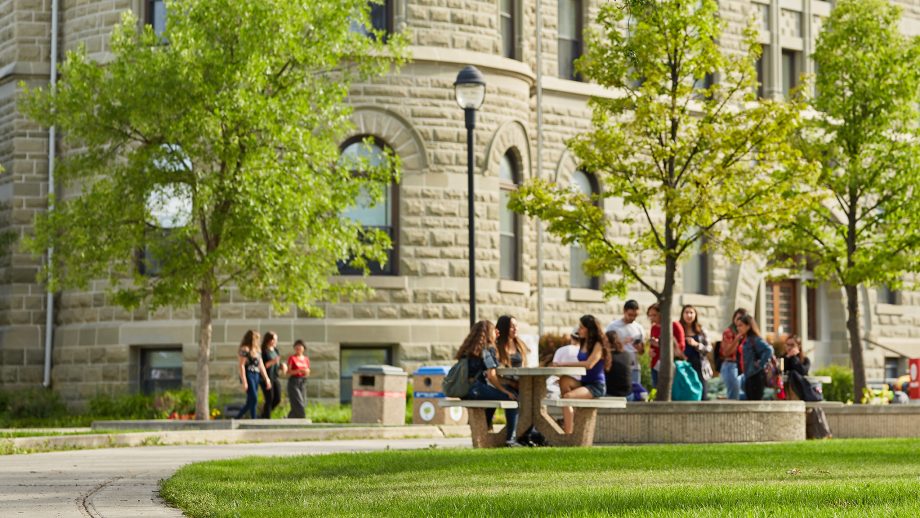Originally published in the Spring 2016 UWinnipeg Magazine
It’s Friday afternoon, and in a classroom on UWinnipeg’s Selkirk Avenue satellite campus, Rayna Gopaul is offering smudge to her classmates in Colonization and Aboriginal Peoples. The second-year class offered by the University’s Department of Urban and Inner-City Studies (UIC) meets weekly for three hours, during which they must cover a lot of ground. Rayna doesn’t rush through the cleansing act, though; she gives each participant time to draw the smoke into their space, allowing it to wash over them.
“Everyone had their smudge, right?” instructor Ryan Duplassie asks as the students get settled. The classroom seats form a circle, an arrangement Department Chair Jim Silver says UIC students appreciate both because of its cultural significance (approximately 40% of them are Indigenous) and the resultant eye contact that “promotes good classroom discussions while representing the idea of equality, rather than hierarchy.”
It’s easy to see why it works. Today, the class is confronting questions that make many Canadians feel uncomfortable: exploring the who, how, and why of the residential school system that forcibly removed thousands of First Nations, Metis, and Inuit children from their homes, in many cases leaving them to suffer horrific abuse. It’s an emotional topic but across the circle an open, respectful, and intelligent discussion emerges about Canada’s past—and present.
“One of the phrases that frustrates me, is referring to residential schools as a ‘dark chapter in Canada’s history,’” Duplassie tells the students. “We are still living in it now. Reconciliation will take a long time and it involves everybody.”
Working toward reconciliation is at the heart of UWinnipeg’s new Indigenous Course Requirement (ICR) for undergraduate students, which comes into effect this fall. Rather than mandating a single course, UWinnipeg students will choose from a list of courses that, like this one, have a content focus on the knowledge, culture, and contemporary realities of Indigenous people in North America. At class break, third-year student Casey Dame expresses excitement about the ICR.
“I think a lot of things, like racism, stem from not knowing, and being uninformed.” – Casey Dame
As a human rights major, Dame is already required to take Colonization and Aboriginal Peoples to graduate. She recognizes the value of gaining knowledge with an Indigenous perspective, which she didn’t experience in elementary or high school. “I guess I grew up in that white privilege set-of-mind,” she explains. “I grew up with people who, even to this day, don’t know much or care much about the past of Indigenous rights and history.”
Dame says her UWinnipeg education will support her eventual goal: a social work career. She also says that what she’s learned enables her to correct others’ misperceptions about Indigenous Canadians during personal interactions. “I think a lot of things, like racism, stem from not knowing, and being uninformed.”
Her classmate, Gopaul, has also experienced a perspective shift thanks to her exposure to Indigenous knowledge in class. Gopaul arrived at UWinnipeg via the Opportunity Fund program, which offers tuition waivers to youth in the care of child welfare authorities, and says her “whole world view” changed when she took her first Indigenous studies class. She’s now aiming for law school once she graduates in 2017 with a double-major in political science and Indigenous studies.
“I’ve been able to really put together what history means today, for me, as an Indigenous person, and how these things directly affect me and my family.” – Rayna Gopaul
“I’ve been able to really put together what history means today, for me, as an Indigenous person, and how these things directly affect me and my family,” she says. “It gave me a sense of cultural pride to know that we had traditions, and language, and beautiful art, and ceremonies, and things—I can’t even explain how important they were to the people—that were lost,” she continues. “And I’m on my own journey right now, to regain some of that—like learning my language from my grandmother—which I probably never would have done, had I not learned how important it was in Indigenous studies.”
The effort to bring in the ICR was sparked by students who recognize the value of experiences like Gopaul’s and Dame’s. It was implemented by University leaders who see its potential to fulfil recommendations for education made by Canada’s Truth and Reconciliation Commission that aim to help Canada heal.
As Duplassie tells his class before a lecture on residential schools: “We are still eyeballs deep in this issue.” He recounts the program designed to achieve assimilation under the guise of education, including the policies behind it and its lasting impacts. He then opens the discussion and receives thoughtful, critical answers that touch on a variety of related issues, until Dame asks a question that seems to beg a complicated answer.
“I don’t fully understand,” she begins, “what needs to be done for justice to be satisfactory?”
Across the room, another student, Lenard Monkman, tenses and leans forward, raising his hand. He waits patiently as the conversation meanders and when it’s his turn, responds to Dame’s question with a simple answer.
“Give land back without the claims process,” he says, pointing out that in the U.S., the Navajo Nation has one reserve that is more than twice the size of all the reserve land in Canada.
It’s a stark and telling idea exchange, of the type Duplassie observes in class all the time. It also exemplifies the vision for UWinnipeg’s Indigenous Course Requirement: the creation of learning opportunities for students to share valuable knowledge with their peers, understand Canada’s past and present—and generate ideas that may lead to a better future.
Megan Benedictson
Click here for more information on UWinnipeg’s Indigenous Course Requirement.






